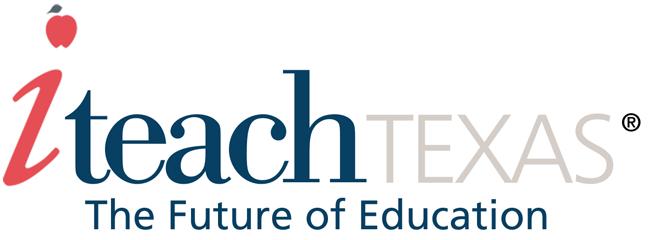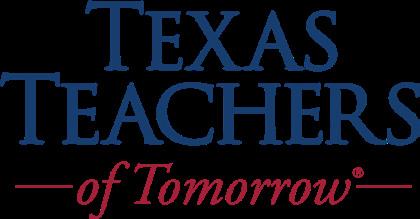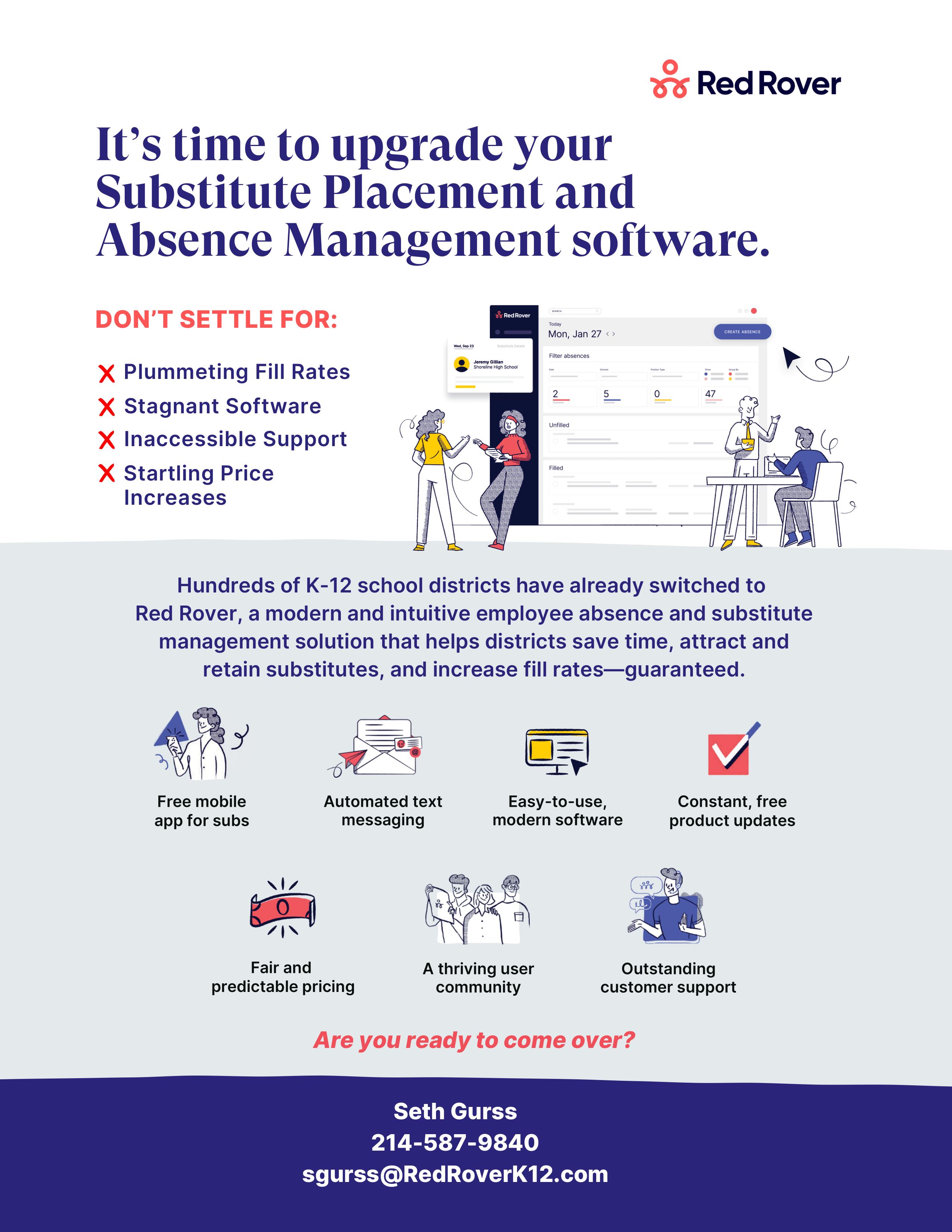




At Kelly ® Education, we’re passionate about connecting people to meaningful, life-changing work. As the nation’s largest provider of substitute educators and staff, we supply and support the people who make learning happen. Every day we help 10,000+ education partners address their recruiting, hiring, and workforce management needs.

Count on us for:
• Substitute Teachers
• Paraeducators
• Early Childhood Educators
• Tutors
• Therapists
• And more!
To learn more, contact:
Jessica Grigsby
Education Sales Consultant - North Texas jessica.grigsby@kellyservices.com
Joshua Montemayor Education Sales Consultant - South Texas joshua.montemayor@kellyservices.com
kellyeducation.com
Chandelle Crane, Executive Director
Jeannie Tomasek, Director of Programs & Membership
Kathy Cervantez, Director of Communications & Professional Development
Al Rodriguez, President, Elgin ISD
Kimberly Rich, President-Elect, Dickinson ISD
Johjania Najera, First Vice President, Keller ISD
Chris Bailey, Second Vice President, Abilene ISD
Craig Lahrman, Secretary, Ysleta ISD
Max Flores, Immediate Past President, Lubbock ISD
Brandon Chandler, District I, Gregory-Portland ISD
Dr. Tyrone Sylvester, District II, Goose Creek CISD
Dr. Tamey Williams-Hill, District III, Manor ISD
Theresa Burkhalter, District IV, Waxahachie ISD
Chris Tatum, District V, Amarillo ISD
Jose Barraza, District VI, Canutillo ISD
Ben Muir, District I, Northside ISD
Brian Kroeger, District II, Splendora ISD
Bob Mabry, District III, Liberty Hill ISD
Jason Liewehr, District IV, Denton ISD
Heath Simpson, District V, Frenship ISD
Bobbi Russell-Garcia, District VI, Ysleta ISD
Kayla Vaughn, District I, Gregory-Portland
Barbara Ponder, District II, Barbers Hill ISD
Kris Reyes, District III, Pflugerville ISD
Greg Gaston, District IV, Keller ISD
Paul Kimbrough, District V, Canyon ISD
Christopher Smith, District VI, El Paso ISD
Charity Salinas, District I, Southside ISD
Marcus Higgs, District II, Texas City ISD
Sue Pfleging, District III, Waco ISD
Asheley Brown, District IV, Little Elm ISD
Paige TeBeest, District V, Amarillo ISD
Celina Stiles, District VI, Socorro ISD
**Includes President, President-Elect & District Representatives
Kayla Vaughn, District I, Gregory-Portland ISD
Dr. Nkrumah Dixon, District II, College Station ISD
Monique Williams, District III, Austin ISD
Kendra Hancock, District IV, Dallas ISD
David Manchee, District V, Amarillo ISD
Fernando Garnica, District VI, Anthony ISD
Melissa Aguero-Ramirez, District I, Pharr-San Juan-Alamo ISD
Shay Sincinski, District II, Bryan ISD
Tammy Nobles, District III, Victoria ISD
Danielle Copeland, District IV, Mabank ISD
Rhonda Dillard, District V, Frenship ISD
Jiovana Gutierrez, District VI, Ysleta ISD
as a $15,000 raise for teachers. Texas teacher salaries are still below the national average by at least $7,500. We must close and overtake this gap. The state also needs to increase its contribution for health insurance premiums and retiree benefits including a COLA.
What a great, and difficult, time to be an educator! When in the history of education has our profession faced such challenges? All of us are dealing with an array of staffing shortages coming off of COVID via the Great Resignation. The fact that the educator pipeline has been shrinking is old news to those of us who have been in the profession for more than a few years. The state has certified more alternative certification candidates than classically trained candidates for the past several years and, we find ourselves having to harden our schools to provide additional safety and security in light of school violence concerns.
All the while, Texas’ 6 Million plus students deserve better. Their needs are as diverse as the state is wide and their future depends on our ability to navigate the political climate. How awesome a task to be able to do so effectively enough to ensure that we serve all children, to protect them from those who would do harm and those who would take away necessary resources.
Thus, welcome to the educational and political landscape of 2023 that lies before us. I want to encourage you to stand up and be a voice for education. The legislative session has begun and everyone will be fighting for a piece of the state’s surplus monies. Thus, priorities I believe we should advocate for are increased compensation, recruitment and retention and school safety initiatives.
Additional funding must be earmarked for educator salaries. Advocates have publicly asked for as much
If the state increases teacher pay then it will better reflect the professional status education should have. This is necessary for us to better recruit and retain employees. At the same time we must advocate for rigorous but flexible educator preparation legislation. We need more individuals in the pipeline but we also just don’t need anybody. Paying proper wages and respecting educators for their profession will help grow the pipeline. Thus barriers to certification such as exorbitant fees and lofty unattainable program goals should be removed or at least altered in a positive manner.
Finally, educators want the same things parents want; safe schools. The legislature has already made attempts to priority school safety. However, these measure should come without unfunded mandates and without so many strings that create additional barriers and a gotcha system to implement. No, teachers don’t need to be armed, but that should be a local decision and the legislature should allow local control for addressing local responses to local needs.
So… I ask all of my fellow TASPA members to be vocal this year. Talk with your representatives. Stand up for Public Education and Local Control. Stand up for what is right and will help us to recruit, retain, support and grow our profession. Stand up for safe schools. Speak out, testify, organize. No matter your position, you have a voice and it needs to be hear.
Respectfully,
 Al A. Rodriguez
Al A. Rodriguez

For more information and updates, please visit our website at taspa.org or call 512-494-9353.
March 23-24, 2023
April 4, 2023
West Texas Mini Conference
Fingerprinting & Service Records
Lubbock Civic Center
ESC Region 13
April 6, 2023
Certification Fundamentals
ESC Region 7
April 19, 2023
Virtual Workshop: Fingerprinting & Service Records Zoom
May 2, 2023
Webinar: Suspension Without Pay: Is it a Myth Zoom
June 13, 2023
Webinar: Processing Employee Grievances Zoom
July 19, 2023
Summer Law Conference
Kalahari Resort, Round Rock
July 19-21, 2023
Summer Conference
September 20, 2023
Certification Fundamentals
October 2-3, 2023
Fall Support Staff Conference
November 6-7, 2023
TASB HR Academy
Kalahari Resort, Round Rock
Northside ISD
Kalahari Resort, Round Rock
Sheraton Austin Georgetown Hotel & Conference Center





Cathy Blue
Business Operations Manager Region 8 ESC
Matt Bolinger Assistant Superintendent of HR Goose Creek CISD
Greg Camarillo Director of HR/Curriculum Santa Rosa ISD
Roxanne Carrillo HR/PR Coordinator Robstown ISD
Cherie Chapa Assistant to Superintendent Banquete ISD
Andrea Chavez HR Coordinator South San Antonio ISD
Joyce Collins Director of Special Programs Crane ISD
Tammy Cunningham Payroll Manager Region VIII ESC
Kriste Davis Administrator Shepherd ISD
Kay Domel Certification Specialist Brenham ISD
Kristal Floyd HR Director Lubbock ISD
Mary Irvan Payroll Clerk ESC Region 8
Christina King Secretary Greenwood ISD Lisa Kirkpatrick Deputy Superintendent Springtown ISD
Chrissy Lutz HR Software Analyst Friendswood ISD
Caitlin Mann Human Resources Springtown ISD
Sylvia Mendoza Admin Assistant to HR Services Plainview ISD
Helen Miller HR Specialist Harmony Public Schools
Michelle Minnick Director of HR/Curriculum Coppell ISD
Angie Ramirez HR Specialist Taylor ISD
Stefanie Ramos Director Plano ISD
Maria Rodriguez Accounts Payable Ballinger ISD
Monica Rojas Personnel Specialist Eagle Mountain-Saginaw ISD
Rose Tran Administrator of Human Resources ESC Region 2
Sharon Wainscott HR Dept/Supt Asst Secretary Knox City-O’Brien CISD
Amber White Principal Shepherd ISD
Joy Wiggins Benefits Coordinator Abilene ISD - Human Resources
















When Speaker Dade Phelan announced the House committees on February 9, public education advocates recognized six members as returning veterans: Vice Chair Dr. Alma Allen (D/Houston), Ken King (R/Canadian), Steve Allison (R/San Antonio), Dr. Brad Buckley (R/Killeen), James Talarico (D/Austin), and Harold Dutton (D/ Houston). The committee will be chaired by Dr. Buckley with Dr. Allen serving as vice chair.
The Public Education Committee will hear several hundred bills during the session. As public schools are the center of communities large and small across Texas, understanding how a bill will affect their community helps the members understand the

implications of their votes on a more localized level.
For TASPA members, an understanding of the committee members’ community ties may provide the personal links and connections that help establish relationships and trust.
New committee members are Charles Cunningham (R/Humble), Cody Harris (R/Palestine), Brian Harrison (R/Midlothian), Cole Hefner (R/Mt. Pleasant), Gina Hinojosa (D/Austin), Oscar Longoria (D/Mission), and Matt Schaefer (R/Tyler). Reps. Cunningham and Harrison are the newest House members on the committee, both of whom are serving their first full terms in the legislature.
Many of the members share several characteristics, including deep community roots. A majority of the
members grew up in their districts and have the long-standing ties that often reflect a firm grasp of local concerns, sustained volunteerism and the community connections that reflect a commitment to the district that translates well in Austin. Five of the members served on elected school boards at the local level prior to their election to the Texas House: Ken King (Canadian ISD), Steve Allison (Alamo Heights ISD), Gina Hinojosa (Austin ISD), Charles Cunningham (Humble ISD), and Chairman Brad Buckley (Killeen ISD).
Chairman Brad Buckley was on the Killeen ISD Board for several terms. His family’s roots in Killeen and Bell County go back several generations. Leo Buckley Stadium in KISD was named to honor his grandfather, a longtime coach and athletic director in Killeen. Brad and his dad were both KHS Kangaroo quarterbacks in their days. Brad grew up in Bell County and has operated his veterinary practice there for over a quarter century.
Vice Chair Alma Allen grew up in Houston, completed her three degrees there, and had a distinguished career in education as a teacher, campus administrator, and district administrator in HISD. She represented Houston on the State Board of Education for over a decade before she was elected to represent HD 131. Her roots in the Houston community are deep and the next three generations of her family have broadened her influence across the community. Longtime House veteran Harold Dutton represents House District 142 in Houston. Dutton, chair of the Juvenile Justice & Family Issues Committee this session, grew up in Houston, attended Houston public schools, earned his BBA at Texas Southern University, and completed his law degree at TSU’s Thurgood Marshall School of Law. Chairman Dutton ranks third in seniority in the Texas House, behind only House Deans Tom Craddick of Midland and Senfronia Thompson, also from Houston.
Ken King’s roots in HD 88 are deep as well. A graduate of Canadian HS, Ken was a CISD school board member and president before his election to the House. His wife grew up in nearby Miami and graduated from Miami HS. Ken’s Black Gold Pump and Supply company is headquartered in Canadian.
Steve Allison served on the Alamo Heights ISD Board of Trustees and on the Board of Trustees of VIA Metropolitan Transit Authority. San Antonio is better for all that Steve has done in his community, as an
attorney and as a volunteer.
James Talarico grew up in the greater Austin area and graduated from McNeil HS in Round Rock ISD. He stayed in the central Texas for his undergrad work at UT Austin, then left to complete his master’s in education policy at Harvard University. After teaching middle school in San Antonio, he returned to Central Texas where he now represents HD 50.
Charles Cunningham was elected in 2007 to serve on the Humble ISD Board of Trustees, where he served for a total of 12 years. In 2019, Charles was appointed to the Humble City Council to fill in a vacancy and was subsequently elected in 2021, where he served until 2022 when he successfully ran for the open House seat formerly held by Dan Huberty who did not seek re-election. A resident of Humble and House District 127 for over 3 decades, Charles has been active in several community organizations and events, including the Gulf Coast Area Association of School Boards, the Lake Houston Chamber of Commerce, and the Boys Scout of America.
Cody Harris has deep roots in HD 8. His ancestors settled in Freestone County after the Civil War and his great-grandfather was the last operator of the Wildcat Ferry on the Trinity River between Anderson and Freestone counties. A graduate of Texas A&M University, Cody owns and operates Liberty Land & Ranch in Palestine, a statewide real estate brokerage firm. His community engagement includes work with the Palestine Area Chamber of Commerce, the Palestine YMCA and the Palestine ISD Business Mentor Program.
Brian Harrison represents HD 10, comprised of Ellis and parts of Henderson Counties. A native Texan and graduate of Ovilla Christian School and Texas A&M (Class of 2004), Brian and his family have long been involved in Ellis County. Brian was sworn-in to the Texas Legislature in October 2021, during the interim of the 87th Session.
A native East Texan, Cole Hefner lives in Mount Pleasant. Prior to his House election in 2016, Cole served as county commissioner for Upshur County. He is active in his community, where he is a member of the Lindale Chamber of Commerce, the Hide-AWay Lake Kiwanis Club, and an active member at South Jefferson Baptist Church. Cole spent 16 years in the construction industry, where he owned his own business, and eventually took over the management of his family’s commercial construction company.
Currently, he is a small business owner in the insurance industry.
First elected to the Texas House in 2016, Gina Hinojosa represents a district in the heart of Austin and the Central corridor of the Texas capital city. Her first policy love is public education and she demonstrated policy insights on many occasions, particularly with legislative oversight of TEA’s treatment of students receiving special education. Prior to becoming a House member, Rep. Hinojosa was elected to an at-large position on the Austin ISD School Board in November 2012. She was elected Board President in 2015. Born and raised in the Rio Grande Valley, Gina is a native Texan and a proud product of public schools. She graduated from UT Austin with Honors with a Plan II Government Bachelor of Arts degree. She received her law degree from George Washington Law School in 1999 and was licensed that same year. She has called Austin home ever since.

Oscar Longoria was born in Mission and raised in South Texas and now represents his hometown. He is a product of the La Joya ISD and attended South Texas College for one year before transferring to UT Austin. He graduated in 2003 with a Bachelor of Science in
Communication Studies. In 2007, Representative Longoria graduated with his JD from the University of Texas School of Law. In 2017, Longoria was the recipient of the 2017 Outstanding Young Texas Ex Award.
Matt Schaefer has broad experience in the private sector and in public service. He retired as a Lieutenant Commander in the U.S. Navy Reserve in 2021. In 2010 he served in Afghanistan near the Iranian border with a provincial reconstruction team. In the private sector, he is self-employed working in real estate and law. He was first elected to the Texas House in 2012. Matt is a sixth generation Texan. Matt has degrees in finance and law from Texas Tech University.
On Tuesday, February 21, the 88th Session will begin its seventh week. With thirty percent of the 140-day session in the rear view mirror, the members work will increase in a significant way. Bills will be assigned to committees and the committee hearings will begin. The House Public Education Committee will hold its regular meetings on Tuesdays. For specific information about committee meetings use https:// capitol.texas.gov/Committees/MeetingsHouse.aspx
Your HR department is busier than ever. We lighten the load from day one.
Edustaff is America’s #1 choice for substitute staffing. Our recruiting, payroll, and staffing services combine the highest quality solutions with a true partnership service approach to help your district achieve more.

We are pleased to announce that Kathy Cervantez joined TASPA as the Director of Communications and Professional Development on February 1.
Kathy Cervantez was born in California, but as the saying goes, she got here as fast as she could. She attended High School in Lubbock, Texas and received her Bachelor of Science degree from the University of Texas at San Antonio (UTSA).
Kathy worked at ESC-Region 20 for over 25 years. She began her career in education as a Certification Specialist for the State Board for Educator Certification Information and Support Center in San Antonio in 1997. In 2001, she became the Supervisor of the SBEC Support Center and held this position until 2003 when SBEC moved the support center to TEA. During her time working for SBEC, she was responsible for providing guidance to educators, school district personnel and educator preparation personnel regarding state rules and regulations. In addition, she was responsible for the selection, training, and daily supervision of eleven Certification Specialists and one Clerk.
For the last 19 years, she continued to serve as a resource to school district personnel by assisting with their certification, recruiting and professional development needs. In addition, she was the Regional TIA Lead for the ESC-20 districts.

Kathy has three children, Kim is married and the manager of a title company, Kylie is a Junior at UTSA, and Cody is a Sophomore at NW Vista College. In her spare time, she likes to go hiking, roam the Target dollar section, and watch cooking shows with her daughter.
“I look forward to becoming a resource to our TASPA members. I have been attending TASPA Conferences for over 19 years and have participated in many amazing professional development sessions, fun events, and made lots of new friends. I am beyond amazed that I get to do this for a living now.”

Kyalla Bowens currently serves as the Director of Talent Acquisition with Crandall Independent School District. She began her career as an elementary teacher in Stillwater, Oklahoma. Ms. Bowens moved to the Dallas area, where she served as a teacher with Duncanville Independent School District. She transitioned to leadership roles serving as an Instructional Specialist, Elementary Assistant Principal, and Principal. Ms. Bowens joined Crandall High School as an Assistant Principal, where she developed her knowledge further with secondary experience.
While in college, Kyalla served in recruitment roles and worked assisting graduating students with their certification process. Recruitment and supporting others in their growth is Ms. Bowens’ passion. As Director of Talent Acquisition, she works collectively with her Human Capital team to recruit and retain employees to ensure the best people are in place for students.

Ms. Bowens earned her Bachelor’s Degree in Elementary Education and Master’s Degree in Curriculum and Instruction from Oklahoma State University. This is her 26th year in education.
Crandall ISD is a fast-growing district in the state of Texas. We are a 5A district with approximately 800 employees serving over 6,000 students. This school year, we opened a Freshman Center, which replaced our previous middle school, and a new state-of-the-art middle school. We will open our sixth elementary school in August 2023.
Crandall ISD is a small town with big growth. Employees have many choices with competitive paying districts and surrounding districts offering four-day work weeks. Crandall ISD focuses on providing quality employee experiences, from the hiring process to employee growth opportunities. We believe that all employees should feel valued and supported.
As a District of Innovation, we offer the opportunity for individuals holding a Bachelor’s degree outside of education and are enrolled in an alternative certification program to teach in a specified area. These individuals have a designated timeframe according to district guidelines to obtain their certification. Our Human Capital team offers and provides test supports to assist these teachers in successfully completing their certifications. It is a challenge at times to retain these teachers that may be shining in the area of teaching, but having difficulty securing their certification.
It was an absolute pleasure to present and attend the TASPA 2022 Winter Conference. I enjoyed making new connections and gaining knowledge from the variety of sessions that were offered.
I have met many members thus far in our TASPA community. It is exciting and reassuring to know there is a wealth of experience and resources available to ask questions and gain insights from other HR professionals.
KYALLA BOWENS CRANDALL ISDAn employee enters stage left into what appears to be the Human Resource’s office: obviously ill and in need of assistance. It’s important to know what is available to your employees under the Family Medical Leave Act (“FMLA”), how they must alert you to their usage of the Act, and where to find the important paperwork. Thus, our story begins:
For starters, know if your employee is an eligible employee for FMLA purposes. To be eligible, an employee must have been employed for a total of 12 months of service; have worked 1250 hours in the immediately preceding 12 months; and must work at a site with 50 or more employees within 75 miles. The employee does not have to have worked for 12 months

continuously, but any service that is more than seven years old will not be counted unless the break was for military service. The third qualifier could mean that the district employs more than 50 employees within a few district campuses, and as long as the campuses are within 75 miles then the employee has met that requirement.
There are specific reasons that qualify an employee for using FMLA leave. If you have questions whether fact-specific scenarios apply, contact your local counsel. These reasons include:

• For the birth of a child, and to care for the newborn child;
• For placement of a child with the employee for adoption or foster care;
• To care for the employee’s spouse, son or daughter, or
parent with a serious health condition;
• Because of the employee’s serious health condition that makes him unable to perform the functions of the job;
• Because of any qualifying exigency arising out of the fact that the employee’s spouse, son, daughter, or parent is a military member on covered active duty or call to covered active duty status; and
• To care for a covered servicemember with a serious injury or illness if the employee is the spouse, son, daughter, parent, or next of kin of the servicemember (referred to as military caregiver leave).
A serious health condition is one which involves inpatient care or continuing treatment by a health care provider, which could include: incapacity of more than
three consecutive, full calendar days; pregnancy or prenatal care; chronic conditions; or permanent/ long-term conditions. Incapacity is better described as the inability to work, attend school, or perform other regular daily activities due to the serious health condition, treatment therefore, or recovery therefrom.
Employers may require that employees comply with usual and customary notice and procedural requirements for requesting leave in foreseeable leave situations, absent unusual circumstances. Requirements may include providing written notice or a requirement that employees contact a specific individual to request leave. The employee must explain sufficiently the reasons for leave so that the employer can determine whether the requested leave qualifies under the FMLA. The employer should ask the employee for any additional information, and the employee must respond to such requests or risk having leave denied. If an employee seeks leave due to an FMLA-qualifying reason for which the employer previously granted FMLA-protected leave, the employee must still specifically reference the qualifying reason for leave or the need for FMLA leave. If timely notice is not given, the period of delay counts as non-FMLA-protected absence, depending on the circumstances.
When leave is unforeseeable, it is still the employee’s burden to request leave. The employee should request leave as soon as practicable under the specific facts of their situation. The Department of Labor (DOL) says it generally should be practicable for an employee to comply with the employer’s usual and customary leave or absence notification policy. Employers cannot require that this notice be in writing, and the notice may be given by a spokesperson for the employee if the employee is unable to do so themselves. A simple example would be if the employee is in an accident and is unable to get to the phone, the employee’s spouse may call in to give notice.
The notification of the need for unforeseeable leave must provide sufficient information for the employer to reasonably determine whether FMLA may apply. No magic words are required, but calling in sick is not enough. The employer should ask the employee for any additional information and the employee must respond to such requests or risk having leave denied. If an employee seeks leave due to an FMLAqualifying reason for which the employer previously granted FMLA-protected leave, the employee must specifically reference the qualifying reason for leave or the need for FMLA leave. If timely notice is not given, the period of delay counts as non-FMLAprotected absence, depending on the circumstances.
There are four general notice requirements for employers: (1) the general notice of posting; (2) the general notice distribution requirements; (3) employee specific eligibility notices/”Rights and Responsibilities”; and (4) the designation notice. Employers must post a general notice posting with FMLA information by hard copy, electronically, or both in English and in any other language if the workforce has a significant portion of non-English speakers who speak the same language. The DOL has posters available in English and Spanish on its website. This must be posted in a conspicuous place so that employees and applicants have access. General notice about the FMLA and districtspecific policies must also be described in policies or handbooks and distributed to all employees. These may be hard copy, electronic, or both.
The eligibility notice may be either oral or in writing and must be provided within five business days of the initial request for leave or when the employer acquires knowledge that an employee leave may be for an FMLA-qualifying reason. This notice must inform the employee of their eligibility status, and if the employee is determined to be not eligible for FMLA leave, state at least one reason why. Within the same time frame, employers must provide the employee with a written Notice of Rights and Responsibilities. A combination Notice of Eligibility and Rights and Responsibilities can be found on the DOL’s website. This form, among other things, notifies the employee if the employer is requiring certification, such as a medical certification, of the need for leave.
The designation notice given by an employer to an employee must be provided in writing within five business days of having enough information to determine whether the leave is FMLA-qualifying, which usually occurs after certification is obtained. The notice must be provided for each FMLAqualifying reason per applicable 12-month period (additional notice is required for any changes in the designation information). This notice must include the employer’s designation determination, and any substitution of paid leave and/or fitness for duty requirements, and provide the amount of leave that is designated and counted against the employee’s FMLA entitlement, if known. If the amount of leave is not known at the time of the designation, the employer must provide this information to the employee upon request, but no more often than once in thirty-day period and only if leave was taken in that period. The DOL also has a prototype Designation Notice on its website.
An eligible employee with a qualifying reason is generally entitled to 12 workweeks of FMLA leave in
a 12-month period, though employees taking military caregiver leave are entitled to up to 26 workweeks of leave. During this period, the employee’s health insurance must be maintained. FMLA leave can be taken either as one continuous block, in blocks of time, intermittently, or on a reduced leave schedule. There are limits on intermittent leave for instructional employees. On return from FMLA leave, an employee is entitled to be returned to the same position the employee held when leave began, or to an equivalent position with equivalent benefits, pay, and other terms and conditions of employment. However, an employee has no greater right to reinstatement or to other benefits and conditions of employment than if the employee had been continuously employed during the FMLA leave period.
It is up to the employer to track the employee’s leave. Employers must track intermittent or reduced schedule leave in increments no greater than shortest period of time that you use to account for use of other forms of leave, provided it is not greater than one hour (not required to account for FMLA leave in increments of six minutes or even 15 minutes simply because payroll system can do so). Employers cannot charge for time spent working.

For example, an employer may use a one-hour increment rule. If they do, when an employee is fifteen minutes late for work, the employer can prohibit the employee from working for one hour. However, if the employee is permitted to work, then only fifteen minutes can be charged to their FMLA leave. If the employee becomes ill thirty minutes prior to the end of the shift and needs to leave, the employer can only charge thirty minutes as FMLA leave.
If it is physically impossible for the employee to access the worksite after start time, the entire period the employee is forced to be absent from the worksite is FMLA leave. Employees must be permitted to resume work when it’s physically possible for them to do so. For example, if a driver is not available to drive bus at start time due to an FMLA reason, he is considered on FMLA leave from start time until the bus returns and it is time for next run, even if he was able to work prior to the start of the next run.
If an employee needs less than a full week of FMLA leave and a holiday falls within the partial week of leave, the hours that the employee doesn’t work on the holiday cannot be counted against the FMLA leave entitlement. However, if an employee needs a full week of leave in a week with a holiday, the hours the employee does not work on the holiday will count against the employee’s FMLA entitlement.
Bonuses and Awards. Employers can now disqualify employees from bonuses or other payments based on achievement of a specified job-related performance goal (such as attendance) where the employee has not met the goal due to FMLA leave; so long as it is done in a non-discriminatory manner.
If you have any questions regarding the FMLA, or a fact-specific scenario you’re encountering with one of your employees, contact your school attorney.




 Laura Rodriguez McLean and Crystal M. Hernandez, Walsh Gallegos1
Laura Rodriguez McLean and Crystal M. Hernandez, Walsh Gallegos1
The law is in a constant state of evolution. School administrators need be aware of how the legal fundamentals they encounter day to day are being interpreted in decisions issued by courts and the Commissioner of Education. More importantly, they need to be able to distill practical guidance from those decisions. The purpose of this article is to highlight some recent cases, and distill the lessons to be learned from them.
Lesson #1 - A Chapter 21 contract teacher cannot be
Kristin Kenney, a middle school teacher on a probationary contract, appealed the Board’s decision to suspend her without pay prior to a hearing being conducted under Subchapter F of Chapter 21 of the Texas Education Code. By way of background, Kennedy was placed on administrative paid leave on January 13, 2022, following allegations of her making inflammatory remarks about students to her colleagues. On January 18, 2022, Kennedy notified the district that she was resigning effective at the end of the 2021-2022 school year. On February 8, 2022, the district notified Kennedy that its board of trustees had voted on that same date to propose
her suspension without pay, and the district stopped paying Kennedy the same day. Kennedy requested a hearing on the board’s action. On June 16, 2022, following a hearing with an independent hearing examiner (IHE), the IHE recommended that Kennedy be suspended without pay. On July 27, 2022, the board voted to adopt the IHE’s recommendation. On appeal to the Commissioner, Kennedy argued that the district violated state law when it suspended her pay despite her timely request for a hearing. The Commissioner agreed. Under current state law, a teacher on a probationary contract who receives notice of a proposed suspension without pay has the right to request a hearing with an IHE under Texas Education Code § 21.251(a)(3). Relying on prior Commissioner decisions and state case law, the Commissioner reinforced the intent of the law - that if a hearing is requested by the teacher, then such hearing must precede the teacher’s suspension without pay. The fact that the IHE recommended suspension without pay, and the Board lawfully voted to adopt the IHE’s recommendation did not cure the school district’s error. The board’s decision to adopt the IHE’s recommendation in July 2022 could not retroactively suspend Kennedy without pay under her 2021-2022 contract. Because the district unlawfully suspended Kennedy before the hearing process could take place, the Commissioner ordered the district to
1 Sharon Pickrell, law clerk, contributed to this article. We greatly appreciated her assistance.pay Kennedy her remaining salary for the 2021-2022 year. The case is Kennedy v. Lamar Consol. Indep. Sch. Dist., No. 054-R2-08-2022 (Comm’r Educ. 2022).
No doubt it is frustrating for a district to continue paying a contract employee whose conduct it believes constitutes good cause to terminate. However, the law is clear on the point that a district may not suspend pay automatically.
Lesson #2 - When it comes to nonrenewal, notice is everything.
Following a board meeting on the proposed nonrenewal of his contract, the Human Resources Director for Marlin ISD gave a written notice to Claude Kelley on May 3, 2022, that stated the following, in part:
“This provides you with notice that the Board of Managers of Marlin Independent School District met on May 2, 2022. The District did not vote to renew your term contract. Instead, the District administration recommended for approval, to the Board of Managers, pursuant to Texas Education Code §21.206 and Policies DFBB (LEGAL/LOCAL), nonrenewal of your term contract at the conclusion of the contract period. Please let me know if you have any questions or concerns.”
Kelley appealed to the Commissioner arguing that he did not receive proper notice of the nonrenewal of his contract. The Commissioner agreed. Relevant provisions of state law ensure that an educator is given specific notices with regard to the nonrenewal process. Here, the written notice that was provided failed to meet most of those requirements. First, a school board must give notice that it proposes to nonrenew the teacher’s contract so that the teacher can request a hearing. Here, the notice Kelley received did not state whether the board itself had proposed nonrenewal; rather, it only stated administration’s recommendation to nonrenew Kelley’s contract. In failing to provide the required notice, the District elected to re-employ Kelley in the same professional capacity for the 2022-2023 school year. Second, Kelley did not receive notice of the reasons for proposed nonrenewal as required by law in either the written notice he received following the board meeting or other correspondence in which he was informed that he had violated certain identified Board policies. Kelly was not informed of any reasons listed under Board policy DFBB (LOCAL) for purposes of his proposed nonrenewal. Therefore, the Commissioner concluded that the nonrenewal of his contract was arbitrary and capricious, and unlawful. The case is Kelley v. Marlin Indep. Sch. Dist., No. 041R1-06-2022 (Comm’r Educ. 2022).
The failure of a school district to follow the statutory procedures on contract action is one of the best ways to get a contract decision overturned. These decisions should involve the assistance of school district’s legal counsel as early as possible. Legal counsel
can certainly assess whether a school district has supported grounds to propose nonrenewal. Counsel can also assist with agenda posting language and the board’s motion language to ensure these items adequately communicate proposed nonrenewal action and otherwise meet state open meetings requirements. Legal counsel can also review or draft the written notice that must issue following the board’s action to propose nonrenewal.
Lesson # 3 – A district has some discretion in the information it considers when making the determination to end assault leave.
A special education teacher, Johnnie Turner, was assaulted by a student while at work and sustained serious physical injuries. Turner requested and immediately received assault leave on November 14, 2019. In addition, Turner received worker’s compensation medical and income benefits for several months. On August 31, 2020, a worker’s compensation doctor examined Turner and found that he had reached “maximum medical improvement” (MMI) on January 22, 2020, with a “zero percent whole-person impairment rating,” as these terms are defined by the Texas Workers’ Compensation Act. However, he found that Turner has not reached MMI for certain neurological conditions and requested additional assessment of these conditions. Subsequently, the Workers Compensation Division of the Texas Department of Insurance’s designated doctor examined Turner on November 5, 2020, and reviewed his medical records. This doctor concluded that Turner would have reached MMI on his neurological issues within days of his assault, and ultimately determined that Turner reached MMI on the injuries caused by the assault on January 22, 2020. On February 22, 2021, the district notified Turner that it was terminating his assault leave as of January 22, 2020.
Turner filed a grievance and appealed to the Commissioner following the school boards denial of his grievance. The issue on appeal for the Commissioner was the scope of the district’s authority to investigate and change an employee’s assault leave status under Texas Education Code § 22.003(b). Turner argued that the district had violated this law by terminating his assault leave based on a review of his workers’ compensation medical records and using workers’ compensation standards to change his assault leave status as ending on January 22, 2020.
The Commissioner examined Section 22.003(b), Texas Education Code, noting that under this law, school districts must pay assault leave immediately upon request, but they are also authorized to subsequently investigate and modify the assault leave benefits paid to an employee. The law does not specify how school districts investigate claims or what information they can consider in an investigation. The law also provides a district the ability to change
an employee’s leave status and to charge excess assault leave against an employee’s personal leave or, if unavailable, the employee’s pay. This ability could only apply to decisions to terminate assault leave on an earlier date or retroactively. Against this authority, the Commissioner found that while workers’ compensation findings do not govern assault leave determinations, districts can consider evidence, including workers’ compensation medical reports, in investigating assault leave because section 22.003(b) does not direct or limit a districts’ investigation. “While not dispositive of assault leave, workers’ compensation medical records are certainly relevant to evaluating work assault injuries and employees’ recuperation from them, and school districts’ consideration of them does not violate section 22.003(b).” The Commissioner went on to determine there was substantial evidence to support the board’s decision to deny Turner his grievance based on the totality of information, including the medical reports of the designated workers’ compensation doctor. The case is Turner v. Mansfield Indep. Sch. Dist., No. 005R10-10-2021 (Comm’r Educ. 2022).
Lesson #4 - When it comes to employee religious expression at work, things are a bit more complicated.
For eight years, in Bremerton, Washington, assistant high school football coach Joseph Kennedy had a practice of kneeling to pray on the 50-yard line after football games. In 2015, the Superintendent sent Kennedy a letter informing him, in part, that any religious expression by Kennedy in which students were involved must be “non-demonstrative” to avoid the appearance of an endorsement of religion. After receiving the letter, Kennedy stopped offering pregame prayers and religious pep talks in the locker room. Through his attorney, Kennedy subsequently sent a letter to the district asking permission to continue to offer a postgame “personal prayer of thanks” in the middle of the football field, something he felt “compelled” to do because of his “sincerely held religious beliefs.” The district responded with a letter stating that Kennedy was to avoid “any overt actions” that could “appea[r] to a reasonable observer to endorse . . . prayer . . . while he is on duty as a District-paid coach.”
Following this correspondence, Kennedy conduct his midfield prayers after three games in October 2015. These prayers received media attention, and Mr. Kennedy was joined by members of the community standing around him as he prayed. After the third game, the district placed Kennedy on administrative leave for his “public and demonstrative religious conduct while still on duty as an assistant coach.” While Kennedy had received positive evaluations in the past, his evaluation in November 2015 rated his performance poorly and recommended against rehiring him for the next season.
Kennedy sued the district, alleging violation of his rights to free speech and free exercise of religion
under the First Amendment. Kennedy took his case all the way to the U.S. Supreme Court, which held that Kennedy had a protected right under the Free Speech and Free Exercise Clause of the First Amendment to engage in his “quiet prayer of thanks.” The district violated Kennedy’s right when it ended his employment.
The Court concluded that Kennedy’s prayers were private and personal, and not governmental speech. According to the Court, Kennedy’s praying after football games on the 50-yard line was not “ordinarily in the scope” of his duties as a coach or seeking to convey a government message. The Court was also not persuaded by the demonstrative nature of Kennedy’s prayers. It did not appear to make a difference that Kennedy prayed while on duty and still in his school uniform, and in the middle of school events widely attended by students and the community. For the Court, these facts were similar to “a Muslim teacher [] wearing a headscarf in the classroom” or “a Christian aide []praying quietly over her lunch in the cafeteria.” The Court also determined that the district’s response to Kennedy was not neutral; rather, it singled out Kennedy for his religious expression during a time frame when other employees “were free to speak with a friend, call for a reservation at a restaurant, check email, or attend to other personal matters.” In other words, other coaches were allowed to engage in their own private speech during this time.
What about the District’s interest in not violating the Establishment Clause? According to the Court, the Establishment Clause in the U.S. Constitution does not “compel the government to purge from the public sphere” anything an objective observer could reasonably infer endorses or “partakes of the religious.” Stated another way, for the Court’s majority, Kennedy’s prayers did not violate the Establishment Clause because they could not reasonably be construed as a religious endorsement and did not coerce student participation in religious activity.
The Court’s holding appears to give public school employees broader leeway in expressing their religious views while at work, so long as the expression occurs outside their normal job duties. As such, a school district can restrict a teacher from incorporating their personal religious views in formal classroom instruction. What is not so clear after Bremerton are the circumstances that define when an employee is not acting in their capacity as a public school employee. Kennedy’s expression occurred minutes after the end of a game, while at work, in his school uniform, and in the middle of the football field. What if a teacher wants to lead a voluntary bible study on school property with high school students in advance of the school day and their duty time? What about a teacher wanting to pray with students at a “Meet at the Pole” event and speak at the event? Yes, things just got more complicated.
The case is Kennedy v. Bremerton Sch. Dist., 142 S. Ct. 2407 (2022).
Lesson #5 - A neutral policy prohibiting all political expression has its value; without such a policy, school administrators are wise to not favor certain political messages over others.
Eric Dodge, a teacher, brought constitutional claims against the Evergreen School District, and select supervisors and administrators, including his principal. Dodge alleged that he had been retaliated against in violation of the First Amendment when the principal told him that he could not bring his Make America Great Again (MAGA) to teacher only trainings, and that if she saw it again, he would need to contact his union representative. For Dodge, the interaction with the principal was a threat of discipline which felt like an aggressive attack. The record showed that Dodge did not wear the hat but did have it out during a training. Following the training, some teachers complained about Dodge to the principal.
The federal district court sided with the school district and individual administrators on their motions for summary judgment. On appeal, the Ninth Circuit Court of Appeals reversed, in part, the summary judgments granted by the district court. The court of appeals concluded that Dodge was engaged in speech protected by the First Amendment. Why?
First, Dodge’s use of the MAGA hat was political in nature, and thus speech on a matter of public concern. Second, Dodge was speaking as a private citizen, and not a public employee. Addressing his claim of retaliation against the principal, the court of appeals held there was a genuine issue of fact on whether the principal, who had authority over Dodge’s employment, had threatened to take adverse action against Dodge when she stated that the next time Dodge had his MAGA hat he would need his union representative. Because it was undisputed that Dodge’s MAGA hat motivated the principal’s actions, the court concluded Dodge had submitted sufficient evidence of a prima facie First Amendment retaliation claim against the principal such that summary judgement should not have been granted.
The court also considered whether the principal had a legitimate administrative interest in preventing Dodge’s speech that outweighed his First Amendment rights. While there was evidence from the principal that staff felt intimidated, shocked, angry, scared and frustrated after learning of Dodge’s hat, there was no evidence that the MAGA hat interfered with Dodge’s ability to perform his job or the regular operation of the school. There was no evidence that it interfered with the teacher trainings.
The court distinguished this case from those situations where a government employer categorically prohibits political messaging of all types as a valid administrative interest. Here, however, there was no such policy in place at the time. The
court also noted that the principal permitted and defended her allowance of other political symbols and expression on the campus, including a Black Lives Matters poster that was hung in the school library. As noted by the court, the principal clearly espoused a viewpoint preference for one type of political message. As stated in the opinion, “That controversial political speech cannot be quelled because others may find the speech objectionable is clearly established.” The principal should have known this, and therefore the summary judgment granted in her favor was reversed.
While Dodge is a federal case out of the Ninth Circuit, it illustrates the value in having a policy in place that prohibits political advertising or expression. Many public school districts in Texas maintain such policies. However, it is important to remember that where such local policies exist, they must be neutral, and consistently and equally applied. If no such policy exists, administrators need to avoid engaging in actions endorsing or admonishing a particular political viewpoint expressed by employees while at work. Dodge v. Evergreen Sch. Dist. #114, 56 F.4th767 (9th Cir. 2022).
Lesson #6 – When it comes to off campus student social media expression, “substantial disruption” at school can be exist where that expression interferes with the rights of other students.
During the 2016-2017 school year, student Cedric Epple created a private Instagram account where he shared posts considered funny but inappropriate for a wider audience. While other students followed the account, Epple only allowed individuals whom he trusted to have access to the account. After creating the account, Epple and his fellow students posted various pictures of classmates, historical images, and comments with racially charged messages that included other students who were Black. Even though Epple intended for the Instagram account to remain private, several students outside the account’s followers gained access to some of the images when the images were shared by one of the account’s followers. Additionally, another student was able to access the account, and the student shared the account’s content with other students. There was immediate impact at school. Once knowledge of the account’s content spread, school administrators were forced to convene with counselors and mental health staff to address the needs of a group of students who communicated they were too upset to go to class.
Teachers complained that most of their students knew about what had happened and wanted to talk about it, they shared that they had to address questions from students without having any information regarding the matter, that many students were upset about the incident, and the lessons for the day had been significantly disrupted. One student who was specifically targeted in a post left school early because she was severely upset. One student missed several days and eventually withdrew
from the school after learning the posts made fun of her physical appearance. School counselors and mental health staff were inundated with students needing help handling their emotions after learning of the racist posts and comments on the account. Epple and his fellow student followers were suspended, and the principal gave notice that he was recommending their expulsion. Epple asserted protection under the First Amendment and took the matter to federal court. The district court granted the school district’s motion for summary judgment on his claims. Epple appealed to the Ninth Circuit Court of Appeals which affirmed the district court’s decision. The issue for court of appeals was whether school administrators could discipline the students for offcampus social media posts. The court concluded that they could based on the substantial disruption caused and because the circumstances arose to the level of bullying and harassment. School administrators may recall the recent U.S. Supreme Court decision in Mahanoy Area School District v. B.L, 141 S. Ct. 2038 (2021). In that case, a cheerleader asserted First Amendment protection regarding social media posts criticizing school officials that she posted on while off campus and on her own time using her personal device. The difficulty for the school district in Mahanoy was that there was not a sufficient showing of the cheerleader’s expression causing substantial disruption at school. According to the U.S. Supreme Court, “substantial disruption” requires “more than a mere desire to avoid the discomfort and unpleasantness that always accompany an unpopular viewpoint.”
Following Ninth Circuit Court case law in this area, the court of appeals held that Epple’s speech warranted disciplinary action because it “bore a sufficient nexus” to the school. First, many students were directly harmed by the content on the Instagram account. Teachers complained about missed instructional time because they were dealing with the quick-spreading news of the racist content. While Epple intended his account to remain private, it was “reasonably foreseeable” that content posted online by the students would reach the school. The court recognized that social media content, by nature, is easily transmittable, persisting long past the initial post. The posts featured identifiable students, with pictures often taken at school, and students outside the account’s followers viewed the account’s content during school hours. Another consideration for the court of appeals was that school administrators must respond to the harassment of their students. Not doing so could have potentially exposed the school district to liability under Title VI to the extent the school knows of a racially hostile environment and fails to adequately respond. The case is Chen v. Albany Unified Sch. Dist., 56 F.4th 708 (9th Cir. 2022).
Chen is not a Fifth Circuit Court of Appeals case, but
Texas school administrators can still draw guidance from it concerning the type of circumstances that arise to “substantial disruption” when holding students accountable for their off-campus expression. Administrators can consider the responses of other individuals, such as students and staff members, concerning the personal impact of the speech and the impact learning environment, such as lost instructional time and students missing school. Additionally, off campus speech can be addressed to the extent it targets specific individuals to the point of subjecting them to potential bullying or harassment, matters in which the school has a regulatory interest.
Lesson #7 - With regard to complaints of sexual harassment and discrimination, administrators need to employ remedial responses and document those responses.
Two cases out of the Fifth Circuit Court of appeals in 2022 addressed the actions taken by a school district that constitute remedial response(s) to claims of harassment and discrimination. In Roe v. CypressFairbanks Indep. Sch. Dist., the Fifth Circuit addressed a student’s claims of Title IX and constitutional violations surrounding her alleged sexual assault by a male student, Doe, while on campus. It was alleged that Doe and Roe had a relationship, and that Doe was controlling and abusive. At the time of the assault, Roe was 14-years old and pregnant. Roe sustained serious internal and external physical injuries requiring surgery. She eventually terminated her pregnancy. Prior to the assault, Roe’s mother had spoken to the assistant principal and other district administrators to express her concerns regarding the students’ relationship and Doe’s behavior. According to the court, the day after the assault, Roe’s mother visited the assistant principal, who said Roe’s mother would not be able to see any surveillance video and said, “If we punish him [Doe], we have to punish her.” Roe’s mother asked about counseling, but was told by campus counselor that the school “does not do that.”
With regard to looking into the matter, the campus reviewed video surveillance of the school and took some statements. However, the district admitted that it could not produce documentation of its investigation due to its document retention schedule. Campus police initially took a report, and the matter was handed over to the Sheriff’s office for investigation. However, the assistant principal did not follow up with Sheriff’s office and did not obtain a copy of the police report from campus police. The assistant principal also admitted that she had initially determined that the incident was a consensual one that went “too far.”
Roe’s absences from school increased after the assault. She intentionally overdosed on Benadryl after enduring harassment on social media that included a photograph of a dead fetus tagged to her, posts calling her a “baby killer,” and posts
encouraging her to kill herself. This was in addition to being confronted in the school bathroom by a group of girls who accused her of trying to get Doe arrested for falsely accusing him of rape. The following school year, she reported being threatened by Doe. While an assistant principal spoke with Doe, the court’s opinion does not reflect that any further action was taken on Doe. Roe subsequently left the district, only to return in March 2016. Upon her re-enrollment, her mom requested that the school schedule her classes to avoid Doe. She was informed that the school would do what it could, but that nothing could be done about the past. According to the court, school personnel refused to provide reassurance or resources to Roe in her return. In 2016, at age 17, she withdrew from school during the spring semester and did not return.
Under Title IX, school districts are liable for studenton-student sexual harassment if (1) the district had actual knowledge of the harassment; (2) the harassment was under the district’s control; (3) the harassment was based on the victim’s sex; (4) the harassment was so severe, pervasive, and objectively offensive that it effectively barred the victim’s access to an educational opportunity or benefits; and (5) the district was deliberately indifferent to the harassment. For purposes of showing deliberate indifference, Roe had to show that the school district’s response was clearly unreasonable in light of the known circumstances. On the issue of whether there was sufficient evidence in this case to raise a question of fact on the issue of deliberate indifference, a quote from the court’s opinion pretty much says it all:
“The totality of the circumstances, including the District’s lack of investigation, awareness of the preassault abusive relationship, failure to prevent inperson and cyberattacks from Doe and other students post-assault, and failure to provide any academic or other appropriate support to Roe, culminated in exactly what Title IX is designed to prevent—the tragedy of Roe dropping out of school. A reasonable jury could find that the District violated Title IX based on these facts.”
The lack of documentation regarding the district’s alleged investigation did not help as it resulted in turning the case into a “she said/she said” dispute as between Roe and the assistant principal. Based on the circumstances, in the court of appeal’s opinion, a jury could go either way in determining whether the District acted with deliberate indifference. Accordingly, the court reversed the summary judgment previously granted in favor of the district on Roe’s Title IX claim. Roe v. Cypress-Fairbanks Indep. Sch. Dist., 53 F.4th 334 (5th Cir. 2022).
The incident in Roe pre-dates the current Title IX federal regulations regarding formal complaints of sexual harassment. The formal complaint process itself requires documentation of the school’s
response to such complaints and investigation. In addition to this documentation, it is recommended that administrators also document (1) any remedial or supportive measures offered and implemented as between the alleged victim and alleged offender; (2) communications regarding the sufficiency of how such supportive or remedial measures are working; (3) communications with law enforcement regarding the status and resolution of any related criminal investigations; and (4) communications with the parties reflecting the reasons for any delays in the school’s investigation.
Another case addressing the adequacy of a campus administration’s response to alleged prohibited conduct is the case of Menzia ex rel. Z.M.-D. v. Austin Indep. Sch. Dist., 47 F.4th 354 (5th Cir. 2022). In the fall of 2017, Z.M.-D., originally from Cameroon, was a sixth-grade student in the Austin Independent School District. Z.M.-D. alleged that other students verbally and physically harassed her, called her racist names, told her to “go back where she came from.” In September, Z.M.-D. and her parent reported the bullying to the assistant principal for sixth grade. The assistant principal said that he would call the harassers’ parents, however he did not actually speak to any parents after making a phone call that was unanswered. At one point, Z.M.-D. told another student she “didn’t want to live anymore” because of the harassment, and the teacher referred her to the school counselor. The counselor performed a suicide risk assessment and referred her for further counseling. Two days later, Z.M.-D. assaulted one of the harassers, allegedly in response to being called a “bitch.” The assistant principal purportedly conducted an investigation and concluded that the incident did not constitute bullying or harassment. The campus principal assigned Z.M.-D. to another assistant principal, given the parent’s unhappiness with the original assistant principal. Z.M.-D. was disciplined for the incident, but the discipline was subsequently removed. Upon her return to the regular campus, Z.M.-D. alleged that she continued to be harassed. Stay away agreements were put into place as between Z.M.-D. and her alleged harassers.
Z.M.-D.’s parent sued the district on her behalf, alleging that it was deliberately indifferent to the harassment Z.M.-D. endured based on her race, ethnicity, and the fact that she was born outside of the United States. The federal district court dismissed the Title VI race discrimination claim pursuant to a motion for summary judgment filed by the AISD, concluding that the district was not deliberately indifferent because it “took some action in response to all of the incidents noted by Plaintiffs, including meeting with Plaintiffs, attempting to contact the parents of the other students reported by Plaintiffs, conducting an investigation and filing a report, offering Plaintiffs counseling services, and ultimately replacing the administrator in charge of Plaintiffs’ claims.” The dismissal was appealed to the
Fifth Circuit.
The Fifth Circuit ultimately agreed with the outcome in the district court on the Title VI claim. To succeed on such a claim, Z.M.-D. had to show as an element of this claim that the district was deliberately indifferent to the harassment. For purpose of Title VI, a school district is deliberately indifferent when its response to the harassment or lack thereof is clearly unreasonable in light of the known circumstances. A school district must respond reasonably to a risk of harm such that it is taking remedial action. The court of appeals determined that when viewed in the totality, the school district’s response reflected that it had not acted with deliberate indifference. However, certain actions by campus administrators were not remedial, contrary to the district court’s conclusion. First, the assistant principal’s call to the alleged harasser was not remedial. He did not reach out to the parent, did not leave a voicemail, or call again. Secondly, campus administrator meetings with the parent and Z.M.-D. to listen to their concerns were not remedial in and of themselves. According to the court, listening to a student’s report of a racially hostile environment is the first step in taking measures to address it, but such meeting is not itself a remedial action because it is not a response to the harassment. The same was true of Z.M.-D.’s reassignment to another assistant principal for the purpose of holding meetings. Here, the reassignment was to make the parent feel more comfortable in bringing forward concerns to the campus’ attention.
However, this was not in and of itself a remedial action in response to alleged harassment.

Menzia helps illustrate what does not constitute remedial action for purposes of showing that a public school has not been deliberately indifferent to a complaint of harassment. In responding to harassment, administrators should understand that meeting with and listening to a parent or student’s concerns is only the first step. In fact, school policies governing complaints of discrimination and harassment generally dictate that campus or district administrators obtain information from the complainant and alleged victim. Examples of remedial steps that a school district can engage in include, but are not limited to, offering counseling, taking appropriate disciplinary action based on the facts known, implementing stay away agreements, offering students counseling, involving law enforcement (to the extent the circumstances rise to the level of potential criminal conduct) and conducting investigations.
We hope that this article provides you not only with an update on the latest legal issues but also some practical best practices. Given the state of division in our communities, we anticipate that concerns of religion, personal expression, and harassment/ discrimination will continue to take the spotlight. Therefore, it is important for administrators to stay informed to future legal developments in these areas.
General Sessions Include:
• Certification Update - Jennifer Rivera: TEA
• TEA’s Investigative Processes - Tina Farrell & Deborah Tramel Owen: TEA
• Ask the Attorney Contract Questions - Dennis Eichelbaum: Eichelbaum Wardell Hansen Powell & Muñoz, P.C.
Breakout Sessions Include:
• Adverse Employment ActionNeeded Documentation and Investigations
• What’s the Cost? TRS ActiveCare Takes on the Market
• Fingerprinting & the Do Not Hire Registry
• FMLA
• FUNdamentals of Employee FUNding
• Professionalism and Social Media
Conference Location: Lubbock Civic Center 1501 Mac Davis Ln Lubbock, TX 70401

• Handling Texas Public Information Requests

• Inappropriate Behaviors & Case Studies
• HR & PR: Driving Organizational Success Together
• Student Suicide: Mental Health and Legal Response
• Title IX: Past, Present, Future
• Building a Compilation of DOI Common Practices for HR Professionals
Hotel Location: Cotton Court 1610 Broadway St Lubbock, TX 70401
RESERVE YOUR HOTEL ROOM




Missing a few hairs on your head? You might be spending time pulling out your hair dealing with a temperamental printer.
Relentless compliance deadlines can induce brain fog.
Struggling to recruit for open positions may lead to a heavy heart.
Work-life balance might feel out of reach — an ever-increasing workload induces a feeling of walking along an endless tight rope.
Thanks to late nights at the office and early mornings, administrators rarely get the recommended 8 hours of sleep — and wake up feeling like they have bags under their eyes.
Aches and pains pop up due to the physical strain of lugging around heavy piles of paper.
Endless manual data entry induces soreness in fingers and hands.
Constant dull aches in the pit of your stomach are common when every season brings a fresh set of challenges.
What would your day-to-day look like if you could make inefficiencies a thing of the past? With only so many hours in a day, you need to be able to make the most of your time — not only for the sake of your district, but also for your own sake.



“Thank you Teachers of Tomorrow for providing me an opportunity to change the lives of students.”
Eric H. Teachers of Tomorrow Alumnus

“SimpleK12 has contributed to our overall mission for success by providing individuals with content that relates to what they are currently dealing with.”

 Stephanie M. Curriculum & Personnel Director
Stephanie M. Curriculum & Personnel Director

“After going through the strategy course, I was calm and more confident going into the exam. The Learning Liaisons taught me great strategies that helped me pass my content exam.”
Nicole G. Resource & ICS AssistantThe TASPA 2022 Winter Conference was held on December 5-7 at the Kalahari Hotel & Convention Center in Round Rock, TX. We had a successful turnout with 286 attendees. The spacious event center allowed for a record 35 exhibitors! We are especially grateful to our Diamond Sponsors: ESS, Frontline, Gulf Coast FCU, iteachTEXAS, Kelly Education, and Texas Teachers. With their support we are able to provide YOU, our TASPA members, with continued services and professional development.
During the three-day conference, TASPA was able to host three general sessions and 40 breakout sessions. We had 64 speakers that included law firms: Eichelbaum Wardell Hansen Powell & Muñoz, P.C.; J. Cruz & Associates, LLC; Ogletree Deakins and Walsh Gallegos Treviño Kyle & Robinson, P.C. We also had presentations from HR practitioners, TEA, TASB HR Services, TRS, TX DPS and many others. Thank you to speakers, TASPA board members, TASPA staff and TASPA members to help make this conference a huge success!

During the second General Session, we acknowledged our 2022 TASPA award winners and scholarship recipients.


Congratulations to Chris Tatum. Chris is the Chief Human Resources Officer for Amarillo ISD. Chris Tatum’s tenure with Amarillo ISD began in 1998. For three years, he served as a teacher and coach at Caprock High School. In 2001, he became an Assistant Principal at Bowie Middle School. He was there for one year before moving to Amarillo High School to serve as the Assistant Principal for four years and Associate Principal for two years. In 2007, the AISD Board of Trustees approved the hiring of Chris to be the Principal at South Lawn Elementary where he served for five years. His experience and skill set was needed at Fannin Middle School where he was Principal for one year before becoming the Director of Secondary Personnel for AISD in 2013. After six years in that role, Chris was promoted to Chief Human Resources Officer of Amarillo ISD in 2019.
Chris and his wife, Dalea are proud parents of two grown sons who both now have families of their own. His delight is in seeing them be successful in their chosen professions and their success as young fathers. Chris is also a proud “Bear” to three grandchildren whom he adores.
Congratulations to Monica James. Monica has worked successfully under the leadership of two Waxahachie ISD superintendents, Dr. Bonny Cain and Dr. Jerry Hollingsworth. She has served in human resources leadership in Round Rock ISD, Manor ISD, and College Station ISD before coming to Waxahachie ISD. She has served in the roles of HR generalist, Assistant Director, Director, and currently holds the title of Chief Human Resource Officer.
Monica came to Waxahachie ISD in 2019 and brought a vision for progress and innovation to the department. She hired a new HR team and transformed the department. Within a year, all records had been converted to a digital format and hiring processes were updated. She led a very green HR team to learn their new roles and responsibilities. Over the last 4 years, the team has grown tremendously under her leadership in all areas of Human Resources. Monica has led the team with integrity and support. She never hesitates to go to bat for a team member or stand up for what she knows is the right thing to do. Monica is always willing to share her knowledge with others.
Monica has been a member of TASPA for 17 years and served on the TASPA Board for 4 years as District II representative. She is proud of being one of the first to become certified as a pHCLE. She is currently serving on the scholarship committee.

Monica has a strong commitment to growing HR Team members by attending TASPA trainings and conferences. She consistently encourages her team to become involved and hold leadership positions in the organization.

Honorary Membership Awards
It is our pleasure to recognize Sharon Fuery and Dr. Lolly Guerra as TASPA Honorary Members.


Sharon Fuery has been an educator for 40 plus years. She was an English teacher and a cheer coach for 13 years. Her personnel/human resources career began as Director Secondary Human Resources in Northside ISD for 13 years and Executive Director of Human Resources in Judson ISD for four years. She served on the Texas Association of School Personnel Administrators (TASPA) Executive Board for five years serving as President in 1999 and was selected as the TASPA Administrator of the Year in 2000. She has served on the TASPA Legislative Committee and was selected to speak to the Texas House and Senate Education committees as a school human resources expert on several occasions. Sharon retired in 2010 after thirty-two years in education. She worked as an HR consultant for Laredo ISD and medical staffing company. In January 2015, she returned to Judson ISD as Interim Executive Director of Human Resources for a brief period. In October 2015, she was hired as a part-time HR Administrator to support the Director of HR at Southside ISD and was later hired as the Executive Director of Human Resources. After serving in Southside ISD for seven years, she retired again in June 2022. In August 2022, she was hired by South San ISD to work part time as the Interim Executive Director for six weeks is now serving as a part-time HR Administrator. She is also working as an HR consultant at Judson ISD. With over 25 years of experience in school human resources/personnel, she also serves as a member of the Education Service Center Region 20 Human Capital Services Advisory Board.
Dr. Lolly Guerra has been an educator for almost 48 years. She began her career as an elementary school bilingual teacher and served in that position for six years. Her career then progressed to serving as a Bilingual Program Coordinator, Assistant Principal, and an Elementary School Principal for 17 years. In 2003 she became the Chief Human Resource officer for the San Marcos CISD and served in that position for 13 years. She retired from the San Marcos CISD in 2016 and the
very next day began her position as Program Director at TASPA. She served in that position for a year and a half and then was selected to lead TASPA as the Executive Director. During her seven years at TASPA, she has presented over 130 workshops throughout the state, and either assisted with or organized 25 TASPA conferences.
In her spare time, Dr. Guerra serves on the Board of Directors of A+ Federal Credit Union where she has volunteered for the last 12 years, including serving as chair of the Board from 2017 – 2020. She has been married for almost 44 years to her husband, Fred, and is the proud mother of one daughter, Andrea. She has been blessed with two grandsons, Jakson and Jameson, who are the light and joy of her life.
Ann Berg Scholarship Award
David Otterstetter is a senior at Southwestern University and will graduate in May 2023 with a certification to teach history at the secondary level. David has maintained a 3.945 GPA, is a US Army veteran and is a firstgeneration college student.
Barry Nettles Scholarship Award
Jessica Roxanne Gross is a senior at Wayland Baptist University and graduated in January 2023 with a certification to teach EC-6 Elementary Core Subjects. She attained a 3.911 GPA and while also serving as a Life Skills Special Education aide for Frenship ISD.
Pete Chernick Scholarship Award
Kayla Good is a senior at Southwestern University and will graduate in May 2023 with a certification to teach EC-6 Elementary Core Subjects and Special Education. Her excellent undergraduate record of 3.902 GPA is evidence that she is both hardworking and committed to her chosen discipline.
North Central TASPA Scholarship
Holly Dasher is a senior at Mary Hardin-Baylor and will graduate in May 2023. She maintains a 4.00 GPA while working, being an excellent student, and campus leader.
Gulf Coast ASPA Scholarship
Kaylie Kramer is a senior at Mary Hardin-Baylor and will graduate in May 2023. Kaylie will be receiving certification in EC-6 Elementary Core Subjects and ESL. Kaylie has excelled academically, volunteers her time in service and leadership organizations such as Heart of Gold and Search Cru.



